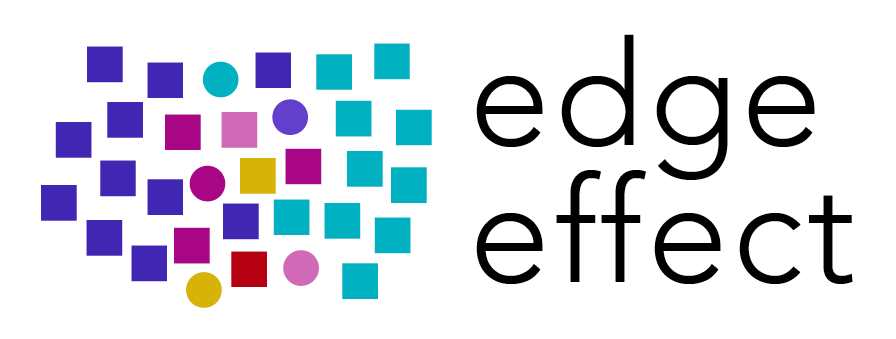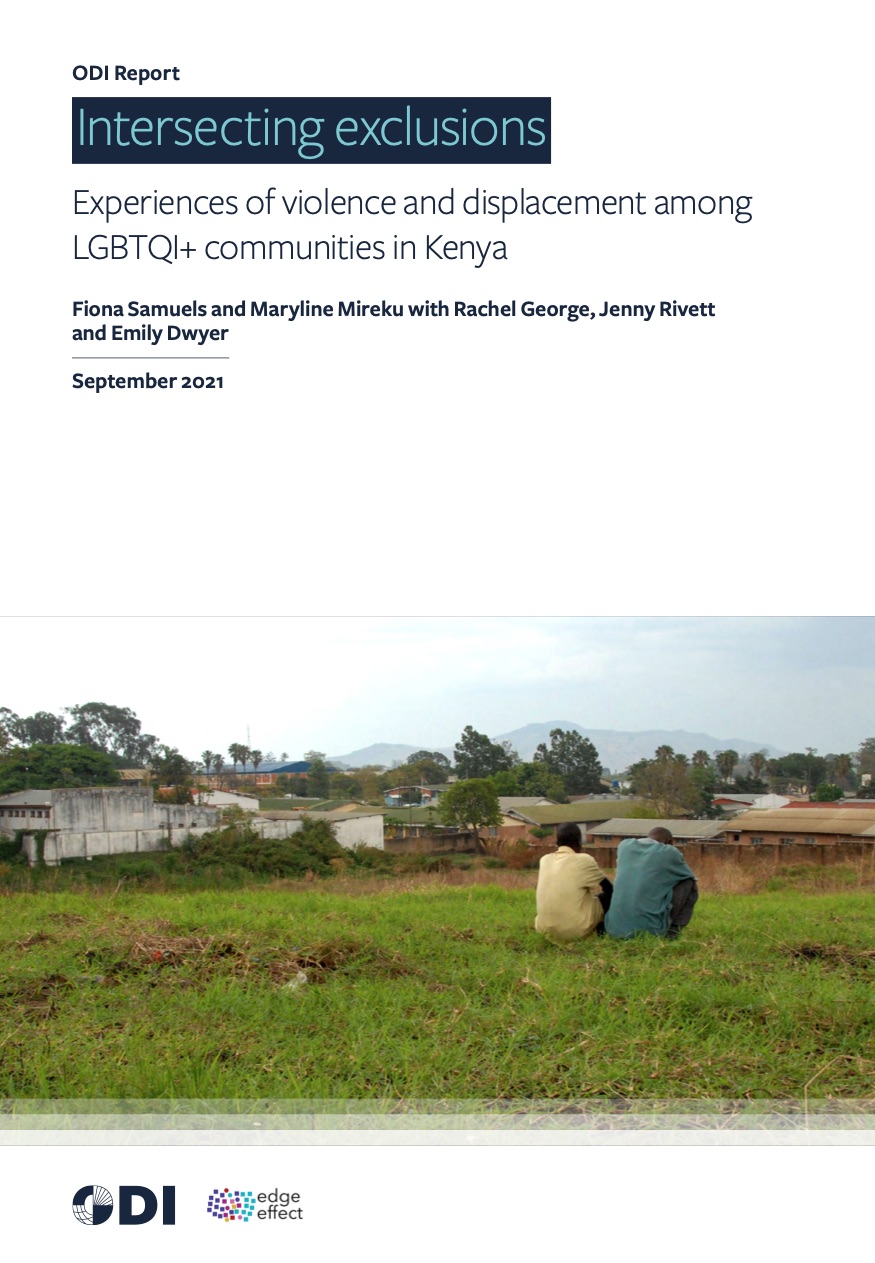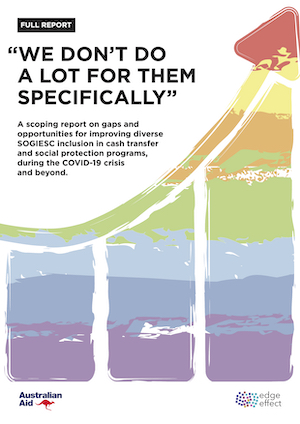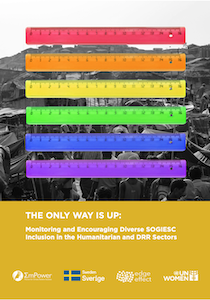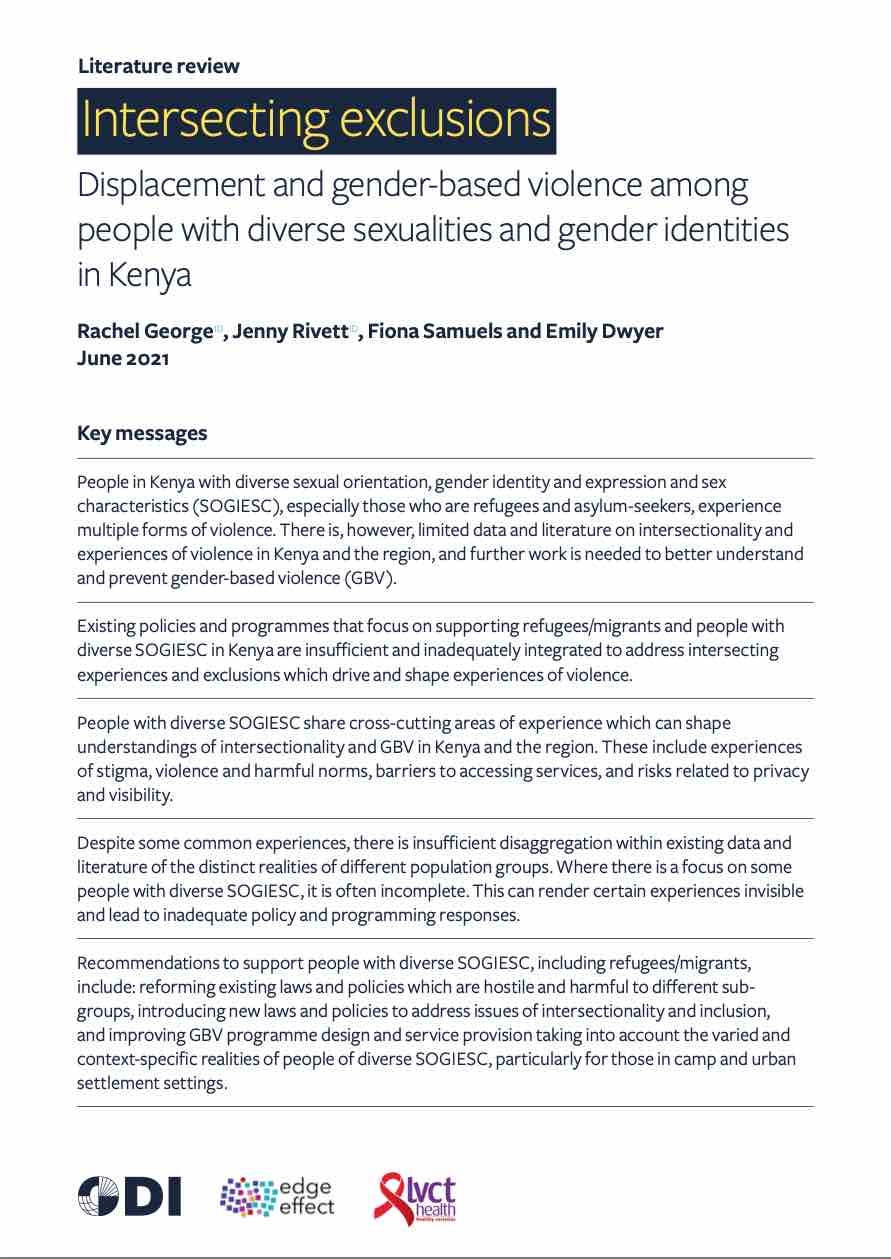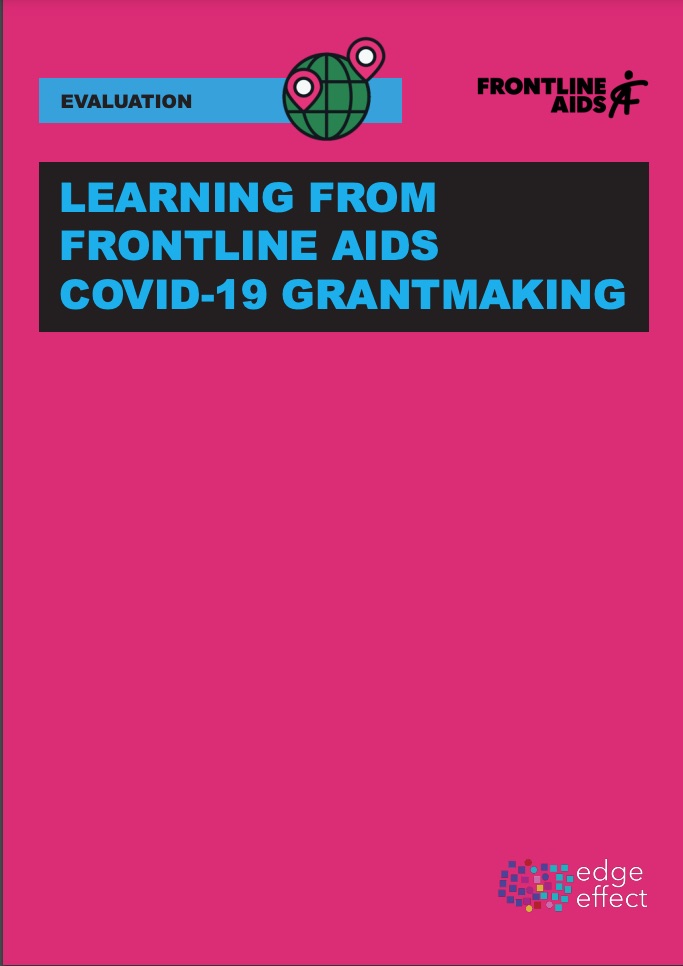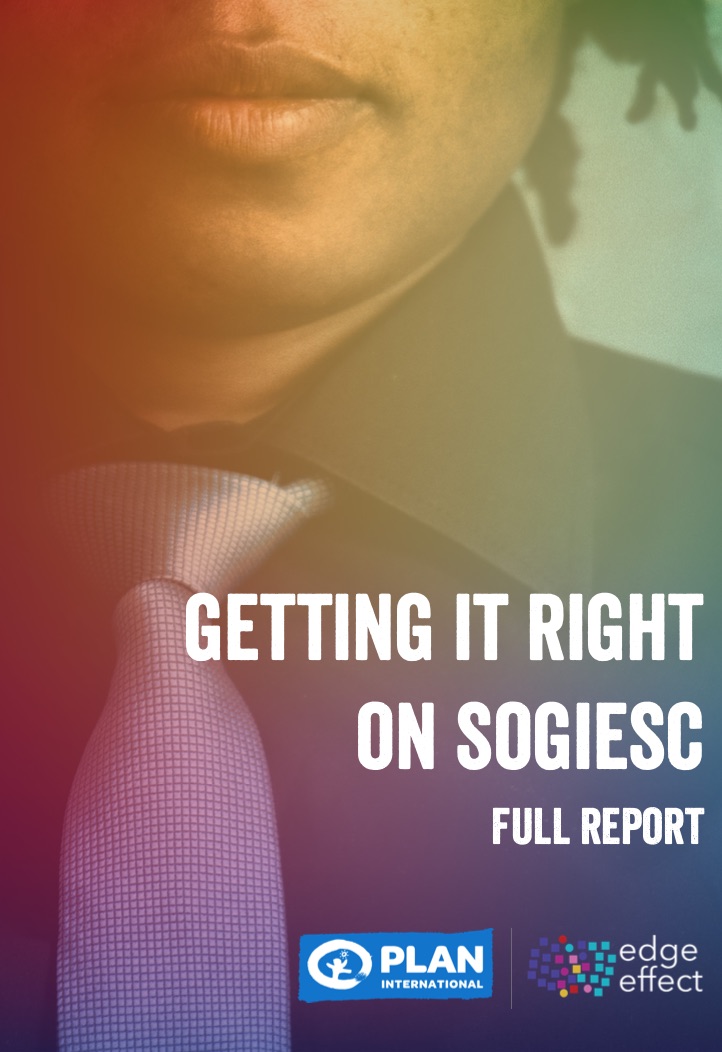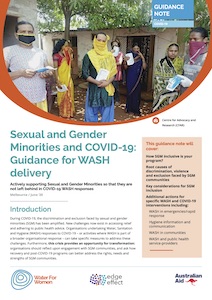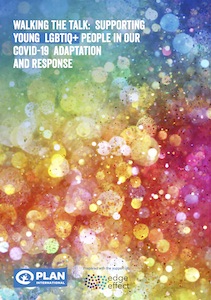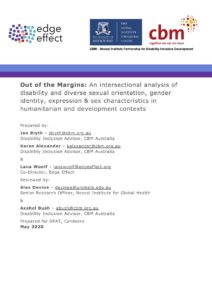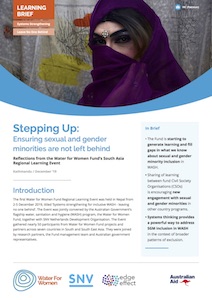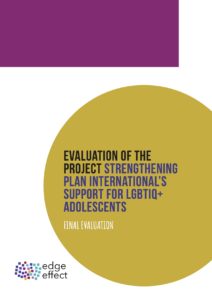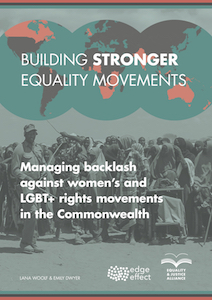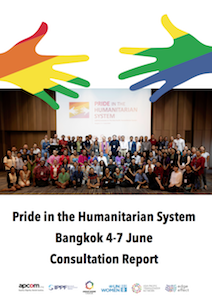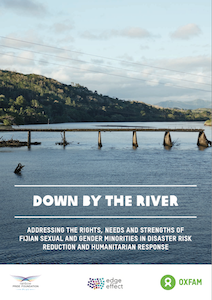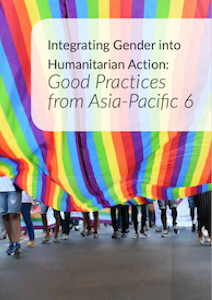Recent Publications
Intersecting Exclusions: Final Report
FCDO/ODI | Sept 2021
Often invisibilised, this research led by ODI and supported by Edge Effect, draws attention to the differences between members of the LGBTQI+ community in Kenya and their experiences of discrimination and violence. Based on key informant interviews and group discussions, the true nature of marginalisation is brought into relief using an intersectional approach.
The report also explores the implications for gender-based violence (GBV) service provision in the country, with recommendations for policymakers and legislators as well as programme implementers and service providers.
We Don’t Do A Lot For Them Specifically
DFAT | August 2021
Cash based assistance is a large part of government and NGO responses to social protection needs during the COVID-19 crisis. But is this assistance reaching people with diverse SOGIESC (aka LGBTIQ+ people). There are clear needs, borne of systemic discrimination, including loss of informal sector work, inability to access support because people do not have ID cards to open bank accounts or enough money to buy mobile phones, risk of gender based violence, and much more. So why don’t we do a lot for them specifically? And what could we be doing?
The Only Way Is Up: Monitoring and Encouraging Diverse SOGIESC Inclusion in the Humanitarian and DRR Sectors
UNWomen | March 2021
In what ways are people with diverse SOGIESC excluded in humanitarian and DRR programs, and why is exclusion by humanitarian and DRR so hard to address? This multi-country study provides new accounts of lived experience from Cox’s Bazar, Mindanao and Vanuatu, and takes a complex systems approach to understanding the lack of diverse SOGIESC inclusion. Findings and recommendations are provided for all levels of the humanitarian and DRR sectors.
Intersecting Exclusions: Literature Review
FCDO/ODI | June 2021
This literature review provides a framing for exploring GBV perpetrated on people with diverse sexualities and genders, and provides a detailed survey of key literature, with a focus on Kenya and East Africa. It is part of the Intersecting Exclusions project, funded by FCDO to explore experiences of GBV among refugees in Kenya who are also people with diverse sexualities and/or gender identities and other intersecting characteristics. The final report is now available (also on this page). The project is led by FCDO with Edge Effect support.
Learning From Frontline AIDS COVID-19 Grantmaking
Frontline AIDS | July 2020
Internal Report – No Download
During April – December 2020, Frontline AIDS and the Elton John Foundation worked together to deliver direct grants for COVID-19 related response efforts. This learning review was commissione to support accountability and learning around funding provided. Methods included consultation and sense-making sessions with Frontline AIDS staff, interviews with grantees and wider practitioners, review of project plans, reports and datasets held by Frontline AIDS, and a brief online survey completed by grantees.
Getting It Right On SOGIESC
Plan International | March 2021
Internal Report – No Download
Plan International commissioned Edge Effect to review its global programming in four key areas and recommend ways that a diverse SOGIESC lens could be brought to this work. The four areas are Protection from Violence, Sexual and Reproductive Health and Rights, Inclusive Quality Education and Youth as Active Drivers of Change. The report also reviewed a wide range of country operating contexts, and provided a matrix through which Plan can assess conduciveness for different programming, while ensuring safety and effective risk mitigation.
Sexual and Gender Minorities and COVID-19: Guidance for WASH delivery
Water for Women Fund | July 2020
During COVID-19, the discrimination and exclusion faced by sexual and gender minorities (SGM) has been amplified. New challenges now exist in accessing relief and adhering to public health advice. Organisations undertaking Water, Sanitation and Hygiene (WASH) responses to COVID-19 can take specific measures to address these challenges. This this crisis provides an opportunity for transformation: organisations should reflect upon engagement with SGM communities, and ask how recovery and post-COVID-19 programs can better address their rights, needs and strengths.
Walking the Talk: Supporting Young LGBTIQ+ People in our COVID-19 Adaption and Response
Plan International | July 2020
The COVID-19 crisis is posing increasing risks to already vulnerable young LGBTIQ+ people. This briefing paper is for all Plan International staff, to help protect and empower these young people by including them in our response to crises and programme adaptations across the world.
Out of the Margins: An intersectional analysis of disability and diverse sexual orientation, gender identity, expression & sex characteristics in humanitarian and development contexts
DFAT DIS | May 2020
This paper shares the findings of an analytical process conducted in late 2018 to early 2019, with the aim of exploring and building understanding of experiences of people with a disability and diverse SOGIESC and providing recommendations to guide efforts to strengthen inclusive development and humanitarian policy and practice.
Stepping Up: Ensuring Sexual and Gender Minorities Are Not Left Behind
Water for Women Fund | March 2020
The Water for Women Fund gender and social inclusion (GSI) framework includes sexual and gender minority (SGM, aka LGBTIQ+ or diverse SOGIESC). This Learning Brief captures key policy and practice development in diverse SOGIESC inclusive WASH, from the Learning Event ‘Systems strengthening for inclusive WASH – leaving no one behind’, held in Nepal in December 2019.
Evaluation of the Project ‘Strengthening Plan’s Support to LGBTIQ Adolescents’
Plan International | January 2020
Plan International commissioned Edge Effect to undertake the final evaluation of the 2016-2019 project ‘Strengthening Plan’s Support to LGBTIQ Adolescents’. The project involved a survey, key informant interviews and focus group discussions with Plan staff globally, leading to findings and recommendations for future inclusion activity. This is a Plan internal report.
Building Stronger Equality Movements: Managing Backlash Against Women’s and LGBT+ Rights Movements in the Commonwealth
Equality and Justice Alliance | January 2020
From acute violence, to surveillance, to disparaging stories, to frustration of progress, online harassment, and targeting of families: backlash is an everyday challenge for activists, CSOs and movements. What is backlash and what are activists doing about it?
Pride in the Humanitarian System
Edge Effect, ASC, APCOM, APTN, IPPF, UNWomen | June 2018
LGBTIQ+ activists and humanitarian actors met in Bangkok in June 2018 to start a conversation about exclusion of people with diverse SOGIESC in humanitarian preparedness and response. While people of diverse SOGIESC have strengths and can leverage their own social networks for survival and recovery, the humanitarian system largely fails to recognise these capabilities or address its own role in perpetuating marginalisation. This report charts the discussion over three days and includes thematic area recommendations and a call to action.
Down By The River: Addressing the Rights, Needs and Strengths of Fijian Sexual and Gender Minorities in Disaster Risk Reduction and Humanitarian Response
Oxfam Australia and RPF | February 2018
Read or Download
This project used a storytelling research methodology to work with people with diverse SOGIESC in three locations in Fiji. We learned together about life experiences before, during and after Tropical Cyclone Winston devastated parts of Fiji in 2016. This report highlights those stories, reviews LGBTIQ+ exclusion in humanitarian policy and practice in Fiji and globally, and provides recommendations for traditional humanitarian actors, for strengthening community response and for further research.
Good Practices from Asia-Pacific 6: LGBTIQ+ Rights and Inclusion in Humanitarian Action and Disaster Rik Reduction
GiHA Asia and the Pacific WG | 2017
A short collection of good practice for the inclusion of people of diverse genders and sexualities in humanitarian action, featuring Down By The River, amongst other projects. Published by the ADPC on behalf of the Regional Network Working Group on Gender in Humanitarian Action in the Asia and Pacific region.
